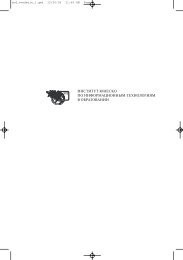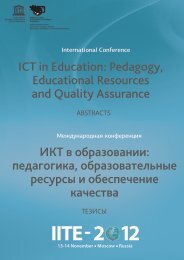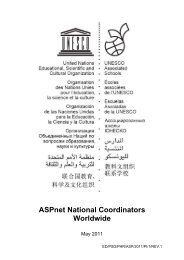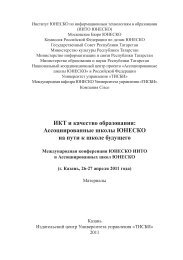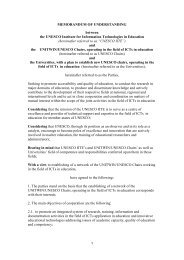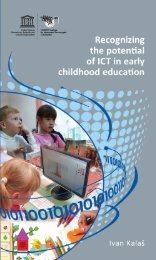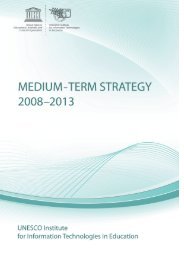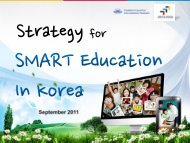UNESCO ICT Competency Framework for Teachers ... - unesco iite
UNESCO ICT Competency Framework for Teachers ... - unesco iite
UNESCO ICT Competency Framework for Teachers ... - unesco iite
Create successful ePaper yourself
Turn your PDF publications into a flip-book with our unique Google optimized e-Paper software.
<strong>UNESCO</strong> <strong>ICT</strong> <strong>Competency</strong> <strong>Framework</strong> <strong>for</strong> <strong>Teachers</strong><br />
8<br />
As pointed out in the <strong>UNESCO</strong> report, Capacity Building of Teacher-Training Institutions in Sub- Saharan Africa 5<br />
( TTISSA), <strong>UNESCO</strong>’s aim is to bring teacher education into alignment with national development goals. These<br />
three approaches enable education to help develop a country’s economy and society, from one which uses<br />
new technology, to one which also has a high-per<strong>for</strong>mance work<strong>for</strong>ce, and fi nally to one which is a knowledge<br />
economy and in<strong>for</strong>mation society. Through these approaches, a country’s students, and ultimately its citizens<br />
and work<strong>for</strong>ce, acquire increasingly sophisticated<br />
THE SIX ASPECTS<br />
OF A TEACHER’S WORK<br />
UNDERSTANDING <strong>ICT</strong> IN EDUCATION<br />
CURRICULUM AND ASSESSMENT<br />
Education re<strong>for</strong>m<br />
PEDAGOGY<br />
<strong>ICT</strong><br />
ORGANISATION AND ADMINISTRATION<br />
TEACHER PROFESSIONAL LEARNING<br />
skills needed to support economic, social, cultural and<br />
environmental development, as well as an improved<br />
standard of living.<br />
The <strong>ICT</strong>-CFT focuses on teachers in primary and<br />
secondary schools. However, these approaches<br />
generally apply to all levels of education: primary,<br />
secondary, vocational and tertiary education, as well<br />
as to on-the-job learning and continuing education.<br />
They also have implications <strong>for</strong> diff erent educational<br />
stakeholders: not just teachers but also students,<br />
principals, <strong>ICT</strong> co-ordinators, curriculum leaders,<br />
administrators, professional learning coaches and<br />
teacher-educators. Because the <strong>ICT</strong>-CFT is based<br />
on theories of economic growth, it may also in<strong>for</strong>m<br />
policies and programmes in government ministries<br />
which deal with economic and social development.<br />
The use of new technologies in education implies new teacher roles, new pedagogies and new approaches to<br />
teacher education 6 . The successful integration of <strong>ICT</strong> into the classroom will depend on the ability of teachers to<br />
structure the learning environment in new ways, to merge new technology with a new pedagogy, to develop<br />
socially active classrooms, encouraging co-operative interaction, collaborative learning and group work. This<br />
requires a diff erent set of classroom management skills. The teaching skills of the future will include the ability<br />
to develop innovative ways of using technology to enhance the learning environment, and to encourage<br />
technology literacy, knowledge deepening and knowledge creation. Teacher professional learning will be a<br />
crucial component of this educational improvement. However, professional learning has an impact only if it is<br />
focused on specifi c changes in teaching.<br />
The <strong>Framework</strong> there<strong>for</strong>e specifi es the competencies which teachers need in all aspects of their work.<br />
5 <strong>UNESCO</strong>. 2005. Capacity Building of Teacher-Training Institutions in Sub-Saharan Africa. Paris, <strong>UNESCO</strong>.<br />
6 Makrakis, V. 2005. Training teachers <strong>for</strong> new roles in the new era: experiences from the United Arab Emirates <strong>ICT</strong> programme.<br />
Proceedings of the 3rd Pan-Hellenic Conference on Didactics of In<strong>for</strong>matics. Korinthos, Greece.



